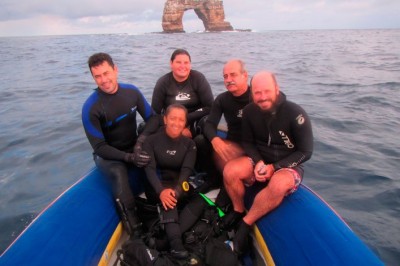NSU Newsroom
SharkBytes
Horizons
This version of NSU News has been archived as of February 28, 2019. To search through archived articles, visit nova.edu/search. To access the new version of NSU News, visit news.nova.edu.
This version of SharkBytes has been archived as of February 28, 2019. To search through archived articles, visit nova.edu/search. To access the new version of SharkBytes, visit sharkbytes.nova.edu.
Halmos Faculty Studies Coral Reefs in Galapagos Islands
In April, Halmos faculty member Bernhard Riegl, Ph.D., traveled to the Galapagos Islands to work with a group of scientists from the Charles Darwin Foundation Scientists (CDF), Ecuador International Conservation (IC-Ecuador), ETPS Regional Program (Eastern Pacific Landscape), Nazca Institute of Marine Research and Nova Southeastern University to study three areas in the Galapagos Archipelago: i) the amount of seaweed Caulerpa sp. in Darwin´s reef; ii) map the coral area; iii) get ecological monitory data to know the actual conditions of the coral areas.
This research was conducted in the new “marine sanctuary” confirmed by the small islands of Darwin and Wolf on the north side of the Archipelago. As a result of this expedition, they were able to determinate that Darwin and Wolf reef communities are in good conditions. Some samples and small colonies were observed. Important reef areas are being affected because of the overgrowth of the Caulerpa sp. seaweed. The territory has increased in recent years (at least, from 2015).
To read more click here
